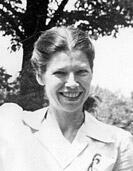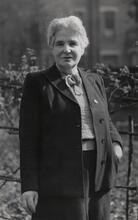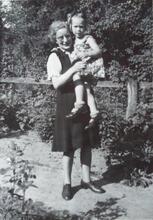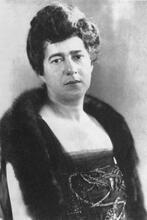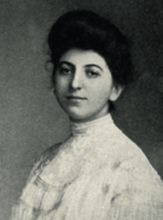Civil War in the United States
Like their gentile neighbors North and South, Jewish women figured in the history of the Civil War (1861–1865) in two ways. As the wives, mothers, and daughters of men in military service, they shouldered a range of responsibilities brought on by wartime exigencies. As community activists, they involved themselves in home-front activities to minister to the soldiers directly and to raise money for the troops. Both of these classic forms of women’s participation in war tended to generate little in the way of documentation, and thus historians studying the involvement of Jewish women in the Civil War and the impact of the war on Jewish women have a sparse body of primary sources upon which to draw.
A Burden on Women
Approximately 10,000 Jewish men served in the armies of the United States and the Confederacy. With 7000 soldiers enlisted in the Union forces and 3000 on the side of the Confederacy, Jews served in the military far out of proportion to their number in the population. As in any war, the engagement of men in the military put a tremendous strain on loved ones left behind, and the over 500 Jewish men who lost their lives in the war created widows, orphans, and bereaved parents whose later lives were shaped by their losses. More immediately during the war, just about each one of the 10,000 men in uniform represented a breadwinner absent from the family economy. Jewish women no doubt had to fill in, both emotionally and financially, for the absent male.
That the war placed a burden on Jewish women can be ascertained from the fact that in a number of communities, like Baltimore, Cincinnati, New Orleans, and Philadelphia, the local Jewish female benevolent associations turned almost all of their attention during the war years to the specific needs of Jewish women whose sons and husbands had gone off to the military. The Jews of Washington, D.C., placed an appeal in the Jewish Messenger to the Jews of New York in which they noted, “Unlike you in New York, we have no fund to support the families of poor soldiers, and the unhappy consequence is, the wives and the children of these poor men are in abject want.”
However compelling the anecdotes about Jewish women’s suffering during the war, the history of the impact of the Civil War on Jewish women and their families and communities remains to be written. The one full-length book that treats the Jews and the Civil War, the 1951 study by Bertram W. Korn, American Jewry and the Civil War, paid scant attention to the home front. It dealt with women and the impact of the war upon them only anecdotally in passing. Later studies, like Harry Simonhoff’s Jewish Participants in the Civil War (1963), Irving Katz’s The Jewish Soldier from Michigan in the Civil War (1962), Robert Shostek’s The Jewish Community of Washington, D.C., During the Civil War (1967), and Mel Young’s Where They Lie: The Story of the Jewish Soldiers of the North and South (1991), offered no fundamental improvement and did not reflect any of the changes in the writing of history that increasingly focused on the analysis of community, family, and gender.
Jews in the War
Details about the ways in which the Civil War affected Jewish community life have surfaced occasionally in a plethora of single-city studies. Historians of the Jewish people of diverse communities like Atlanta, Baltimore, Buffalo, Chicago, Syracuse, Rochester, Utica, and elsewhere considered the Civil War a significant moment in local Jewish affairs. Usually, however, the authors of these studies have limited themselves to naming the Jewish men of these communities who participated in the war, or they have discussed the impact of the war on the local Jewish economy. For example, for Jewish communities in cities like Buffalo and Rochester, where most Jews made a living in tailoring and other aspects of garment making, the war represented a tremendous economic boon. Jewish tailors and merchants in these cities received government contracts to make uniforms, and their marginal enterprises prospered. No doubt, Jewish women participated in this economic transformation, since the earlier, more marginal tailoring establishments functioned as family-based enterprises, with wives and daughters sewing and selling alongside the men. These community histories also have not examined this change in Jewish business in the context of women’s experiences, and so provide little specific information and no analysis of the impact of the war on women.
The Civil War memoir of Marcus Spiegel, born in 1829 in Abeheim, Germany, constitutes one of the few documents that hint at the impact on a wife and family of a Jewish husband’s military service and his death in battle. Spiegel served as second lieutenant in the 67th Ohio Volunteer Infantry and then as colonel in the 120th Ohio Infantry. He sent a steady stream of letters to his wife, Caroline, a convert to Judaism, up to the time of his receiving a mortal wound on April 30, 1864. These letters, published in 1981 as Your True Marcus: The Civil War Letters of a Jewish Colonel, provide an occasional glimpse into the impact of the war on Caroline Spiegel. In a letter marked “Strictly private,” Marcus addressed his “good, lovely and abused Wife!” He explained, “I speak truly when I say ‘abused Wife’; a Woman as good and lovely, as saving and industrious, as kind a wife and good mother as you are should [not] be left alone hundreds of miles from her husband who loves her more and with more fervor, zeal, and devotion ... with 3 small children and one coming, or that he should leave her at all.” More prosaically, on February 17, 1862, he begged her to send him a pair of boots as well as “something nice to eat in the Box. … A bottle of something to drink won’t hurt anybody.” As Spiegel lay dying from his wound, he reportedly wept to the surgeon, “This is the last of the husband and father, what will become of my poor family?” The scattered details offered by Your True Marcus, however sparse, represent one of the few personal insights into the life of a Jewish soldier in the Civil War and the involvement of his wife back home in his military service.
Jewish Women’s Activities
Organized Jewish women’s activities on the community level in a number of cities, in both the North and the South, to sustain the war effort have received more, although still inadequate, attention. In Philadelphia, the women of Congregation Ritual bathMikveh Israel turned the synagogue into a hospital, and the various Jewish women’s sewing societies began to produce uniforms for men in the Union Army. At the annual exercises of the Hebrew Sunday School Society in 1863, the Synagogue cantorhazzan, Sabato Morais, called upon the women of the congregation to make an even greater contribution to the Union cause. Morais publicly read a letter he had received from Mary Rose Smith, head of the Visiting Committee of the Women’s Branch of the United States Sanitary Commission, requesting that a woman from the congregation be appointed to represent Mikveh Israel to the Sanitary Commission. The women of the congregation met and elected Matilda Cohen to take on this responsibility, and under her auspices the women of the congregation formed themselves into the Ladies Hebrew Relief Association for the Sick and Wounded Soldiers. Celia Meyers became the president of this group, and within a month 250 women had joined. By the war’s end, this organization had sent ten crates of supplies to the Sanitary Commission. Additionally, in Philadelphia, as in many other cities on both sides of the conflict, Jewish women participated in communitywide, interdenominational fund-raising fairs. A group of nine young Jewish women who had formed themselves into a club called Alert provided the embroidery and needlework to be sold at the fair.
While less information is currently available about Jewish women’s activities in other cities, Philadelphia Jewish women did not differ from their sisters elsewhere. Bits of information from numerous other cities confirmed that Jewish women participated, as Jewish women, in a wide range of charitable functions to support war efforts across America. Three Jewish women in Detroit helped found the interdenominational Ladies’ Soldiers’ Aid Society. The wives of members of New York’s Temple Emanu-El sewed uniforms for the Union soldiers, of a quality “far better,” according to the New York Times, “than some specimens turned off from the contractors’ shelves.” A young Jewish woman in Columbus, Georgia, belonged to the Soldiers Aid Society and spent time in the Columbus Hospital tending the ill and dying. She actually taught one of these dying soldiers to read and write in order to divert him from thinking about his pain. A Jewish woman in Washington, D.C., wrote of the activities of the women of the Washington Hebrew Congregation and noted, “As in all wars the ladies of Washington aided the overtaxed hospital personnel. …The daughters of my late grandparents, the Reverend [Abraham] Simon and Hannah Mundheim, were among these good Samaritans.” Simon Wolf reported in the Jewish Messenger of May 6, 1864, about a Sanitary Fair in the capital city that “the Hebrew Society’s Table is credited for $756.95; and ... the entire receipts were only $10,661.47. … All honor to our fair Jewesses!”
Indeed, given the tremendous involvement of Jewish women with charitable work, it is reasonable to assume that most of the Jewish home-front contributions in terms of organizing fairs, preparing bandages and lint, sewing uniforms, visiting the sick and wounded, looking after the needs of orphans and widows, and providing hospitalities for Jewish soldiers represented the activities primarily of women.
The labors of Jewish women for the Civil War cause aroused little conflict, and their activities unified one community after another, as Jews expressed their solidarity with their adopted homes, specifically as Jews. The only controversy that flared occurred in Rochester, New York, where the president of Congregation B’rith Kodesh, obviously a man, since women neither belonged to nor held office in synagogues, protested the participation of Jewish women in the local bazaar as Jews. The Jewish Record picked up on this theme and asked its readers why “pretty Jewesses” were distinguished in their charitable and patriotic endeavors from other women.
Impact and Legacy
This incident conflicted with the widespread praise that non-Jews, women and men, and Jewish men, during the war and in subsequent generations, offered to Jewish women for their communal leadership. Herbert Ezekiel’s 1915 comments to the Rimon Lodge of the B’nai B’rith of Richmond, Virginia, may have typified the overwhelmingly positive reactions toward the efforts of Jewish women, when he acclaimed the Jewish women of Richmond, who “fed the hungry, clothed the poor, nursed the sick and wounded and buried the dead. The wives and mothers and sisters did valiant work in the hospitals.”
These two exceptional cases do not, however, challenge the basic assertion that the Civil War represented a notable moment in the history of Jewish women because of the economic and emotional burden it placed on them, on the one hand, and the central role that women played in mobilizing Jewish home-front activities, on the other. These two phenomena represent an unstudied aspect of American Jewish history and one of tremendous consequence.
Bodek, Evelyn. “‘Making Do’: Jewish Women and Philanthropy.” In Jewish Life in Philadelphia, 1830–1940, edited by Murray Friedman (1983): 143–162.
Ezekiel, Herbert. The Jews of Richmond During the Civil War (1915).
Katz, Irving I. The Jewish Soldier from Michigan in the Civil War (1962).
Korn, Bertram W. American Jewry and the Civil War (1951).
Massey, Mary E. Bonnet Brigades (1966).
Shosteck, Robert. The Jewish Community of Washington, D.C., During the Civil War (1967).
Simonhoff, Harry. Jewish Participants in the Civil War (1963).
Young, Mel. Where They Lie: The Story of the Jewish Soldiers of the North and South Whose Deaths—[Killed, Mortally Wounded or Died of Disease or Other Causes] Occurred During the Civil War, 1861–1865 (1991).

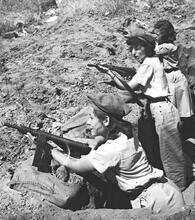
![roisman.jpg - still image [media] roisman.jpg - still image [media]](/sites/default/files/styles/medium/public/mediaobjects/roisman.jpg?itok=7iKIF0ev)
